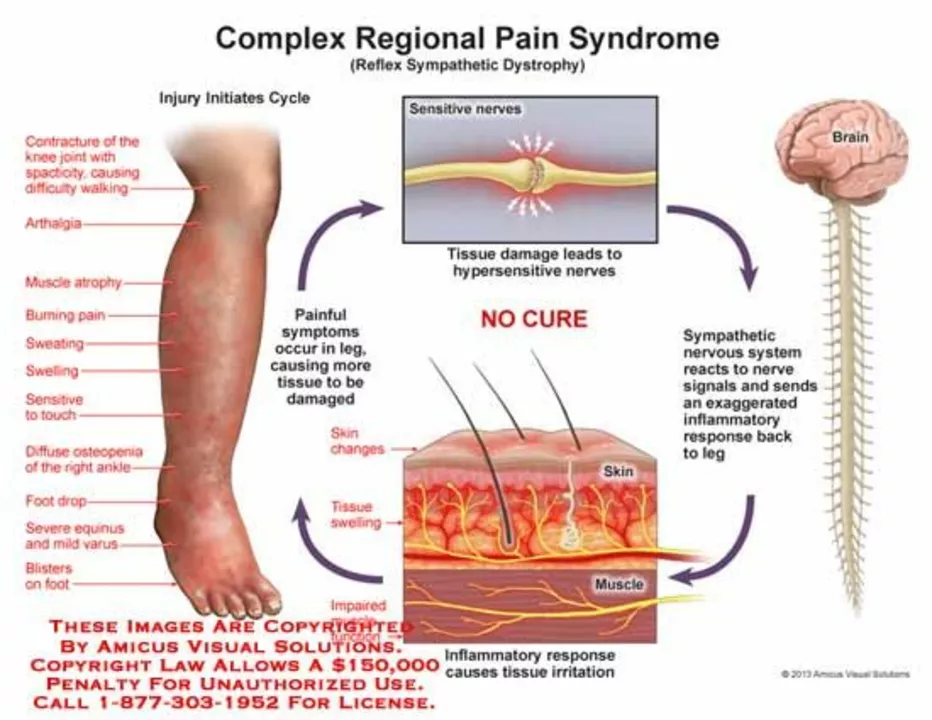Nerve Pain: What It Feels Like and What You Can Do Now
Nerve pain (neuropathic pain) feels different from an ordinary ache. It often stings, burns, shocks, or makes parts of your skin overly sensitive. Some people say pins-and-needles, others get constant burning that wakes them at night. If you’re reading this, you want straight answers: what causes it, how doctors find the problem, and what actually helps. Here’s a clear, practical guide.
What causes nerve pain and how it’s diagnosed
Common causes include diabetes (high blood sugar damages nerves), shingles, nerve compression (like a herniated disc or carpal tunnel), traumatic injury, chemotherapy, vitamin B12 deficiency, and some autoimmune conditions. Sometimes no clear cause shows up — that’s frustrating but not unusual.
How do doctors check? They start with history and a neuro exam: you’ll be asked about the pattern of pain, weakness, numbness, and triggers. Routine blood tests look for diabetes, B12, thyroid problems, and inflammatory markers. If needed, they order nerve conduction studies and EMG to find where a nerve is damaged. For small-fiber neuropathy, skin biopsy or specialized tests may be used.
Practical treatments and self-care that help
There’s no single cure, but many options reduce pain and improve function. Medications commonly used are gabapentin or pregabalin (they quiet overactive nerves), duloxetine and amitriptyline (certain antidepressants that also relieve nerve pain), and topical options like lidocaine patches or capsaicin cream. Over-the-counter painkillers help less for nerve pain, but they can ease related aches.
Non-drug approaches matter. Physical therapy helps with posture, mobility, and nerve glide exercises. Transcutaneous electrical nerve stimulation (TENS) can reduce pain for some people. For focal problems—like a compressed nerve—steroid injections or procedures can relieve pressure. In rare cases, surgery is an option.
Daily habits you can change today: control blood sugar if you have diabetes, check and correct vitamin B12 deficiency, stop heavy drinking and smoking (both worsen nerve damage), and keep active with low-impact exercise like walking or swimming. Use comfortable shoes and inspect feet daily if you have numbness. Apply heat or cold for short periods for flare-ups, and try gentle stretching to ease compression.
When is it urgent? See a doctor promptly for sudden weakness, loss of bowel or bladder control, severe progressive symptoms, signs of infection (fever and red skin), or new severe pain after trauma. If pain is constant and affecting sleep or mood, talk to your healthcare provider — treating pain early gives better results.
Final tip: managing nerve pain often requires a mix of treatments. If one approach doesn’t help, ask about combining meds with therapy, lifestyle changes, and targeted procedures. Keep notes on what worsens or improves your pain—small details help your clinician fine-tune the plan.
How to Manage Chronic Hepatitis C-Related Nerve Pain
As someone living with chronic Hepatitis C, I've experienced nerve pain and found ways to manage it. First, I've learned to maintain a healthy lifestyle with regular exercise, a balanced diet, and stress management. Second, I've found relief through over-the-counter pain relievers and prescribed medications, under my doctor's guidance. Additionally, alternative therapies like acupuncture and massage have proven helpful for me. Lastly, I've discovered that joining a support group and connecting with others facing similar challenges has made a huge difference in my journey.
VIEW MORE
